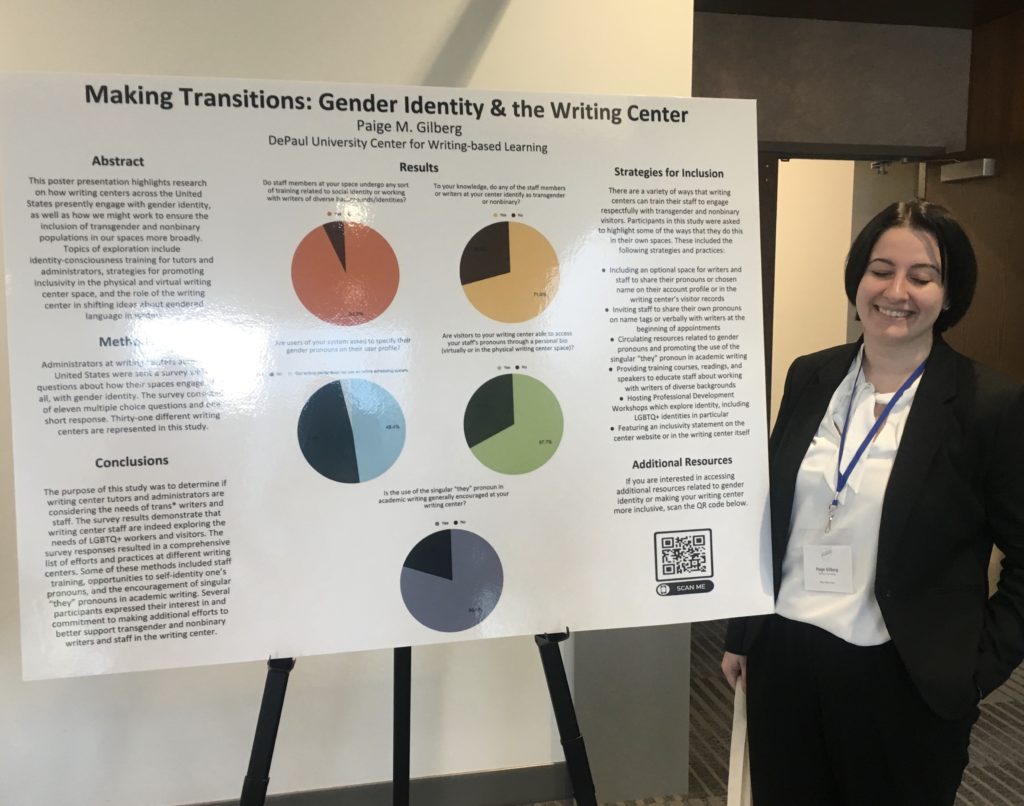When I decided to submit a proposal to the International Writing Centers Association (IWCA) conference last year, I knew that I was not just stepping, but leaping, right out of my comfort zone. Public speaking is generally something that I try to avoid at all costs. Having a weekend to collaborate with fellow writing center staff seemed like a great learning opportunity, though, and I wanted in. As I reflect on this decision almost a year later, I’m so glad that I pushed myself to submit a proposal.

For my proposal, and subsequent presentation, I chose to explore a topic that I know a fair bit about: being nonbinary in the writing center. Though many writing center scholars have written on LGBTQ+ experiences over the last few years, few have focused specifically on the experiences of transgender and nonbinary writers, tutors, and administrators. The goal of my research project, titled Making Transitions: Gender Identity and the Writing Center, was to begin filling in these gaps.
One challenge that I faced while working on this project was collecting data. The research process proved difficult—in part because I am not the most seasoned researcher—but primarily because little research has been done on the topic. This meant starting from scratch, and I decided to develop a survey that would allow writing centers to share their methods, if any, for combating cisnormativity in their spaces. I sent my survey to about 100 university tutoring centers across the United States, hearing back from one-third of them. Though this sample size was small, and really only a preliminary study, the survey results taught me a great deal about how different writing centers engage with gender diversity. My findings culminated in a poster presentation, which allowed me to have many powerful one-on-one conversations with conference attendees.
Findings
- 93% of respondents stated that their writing center staff undergoes some form of training related to social identity or social justice.
- 80% of respondents stated that their writing center encourages the use of the singular ‘they’ pronoun in academic writing.
- 71% of respondents stated that their writing center, to their knowledge, had staff members who identified as transgender or nonbinary.
- 68% of respondents stated that visitors to their writing center could access their staffs’ pronouns (virtually or in the physical space).
- 48% of respondents stated that users of their scheduling system had the option to specify their pronouns if desired.
My first reaction to these results was “Wow! Things are better than I thought!” I quickly realized, though, the limitations of my research method. Since my respondents had willingly taken the time to fill out the survey, they were likely individuals who were already interested in LGBTQ+ rights and inclined to support transgender and nonbinary people. It made sense, then, that the numbers were pretty positive.
What I found to be the more concrete and meaningful part of the survey, though, were the free responses. I asked writing center administrators, “What methods, if any, does your writing center utilize to promote an inclusive environment for transgender/nonbinary staff or visitors?” From these responses, I was able to compile a list of suggested strategies for promoting inclusion and breaking down cisnormativity in the writing center. These are just a few of the ways that writing centers can begin to support transgender and nonbinary writers and staff.
Strategies for Inclusion
- Including an optional space for writers and staff to share their pronouns or chosen name on their account profile or in the writing center’s visitor records
- Inviting staff to share their own pronouns on name tags or verbally with writers at the beginning of appointments
- Circulating resources related to gender pronouns and promoting the use of the singular “they” pronoun in academic writing
- Providing training courses, readings, and speakers to educate staff about working with writers with LGBTQ+ identities
- Hosting Professional Development Workshops which explore identity, including queer identities
- Featuring an inclusivity statement on the writing center website or in the center itself
Overall, presenting these findings at the IWCA conference was a great opportunity to engage in meaningful conversations surrounding gender identity in the writing center. I had the opportunity to speak with some of the respondents in person and also learn from writing center staff who I had not reached out to. The responses from conference attendees were generally positive and many were excited to take these methods back home with them to their own writing centers.
As I reflect on this experience, I am reminded of how fortunate I am to work at a writing center like the UCWbL, where many of our tutors and administrators are open-minded and willing to honor and celebrate the identities of our staff. I was excited to learn that many writing centers are promoting such inclusivity in their spaces, laying the foundation for other writing centers to follow suit. I hope that by sharing my research, I can play at least a small role in this progress.
For additional resources on supporting LGBTQ+ inclusion in the writing center, check out this handout.
Discover more from UCWbLing
Subscribe to get the latest posts sent to your email.
